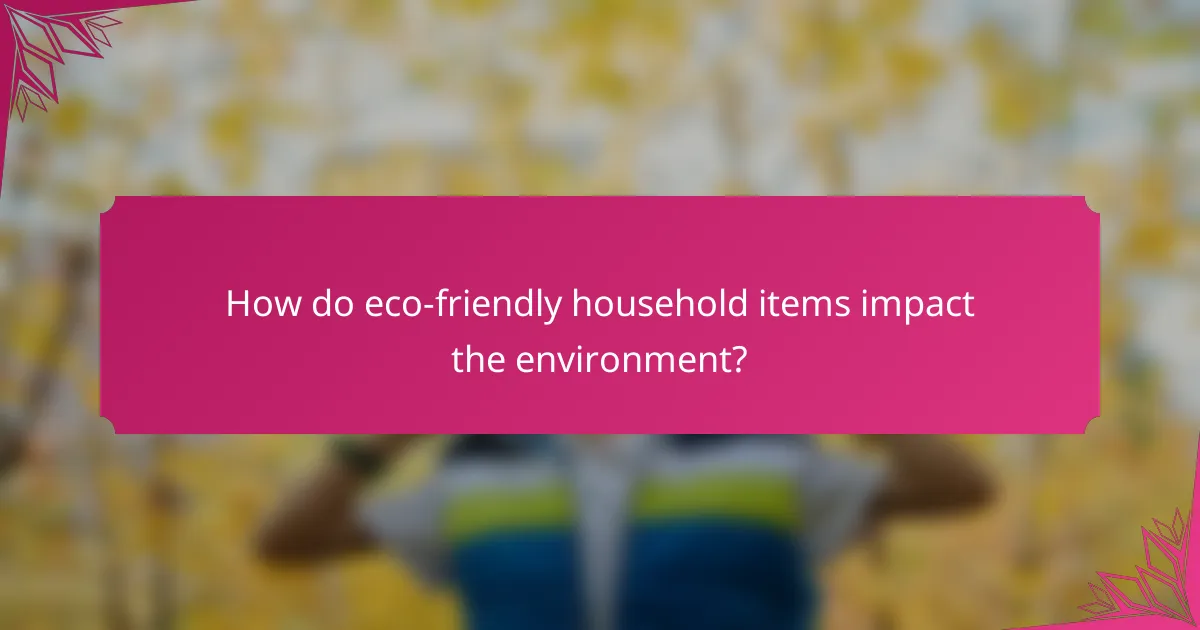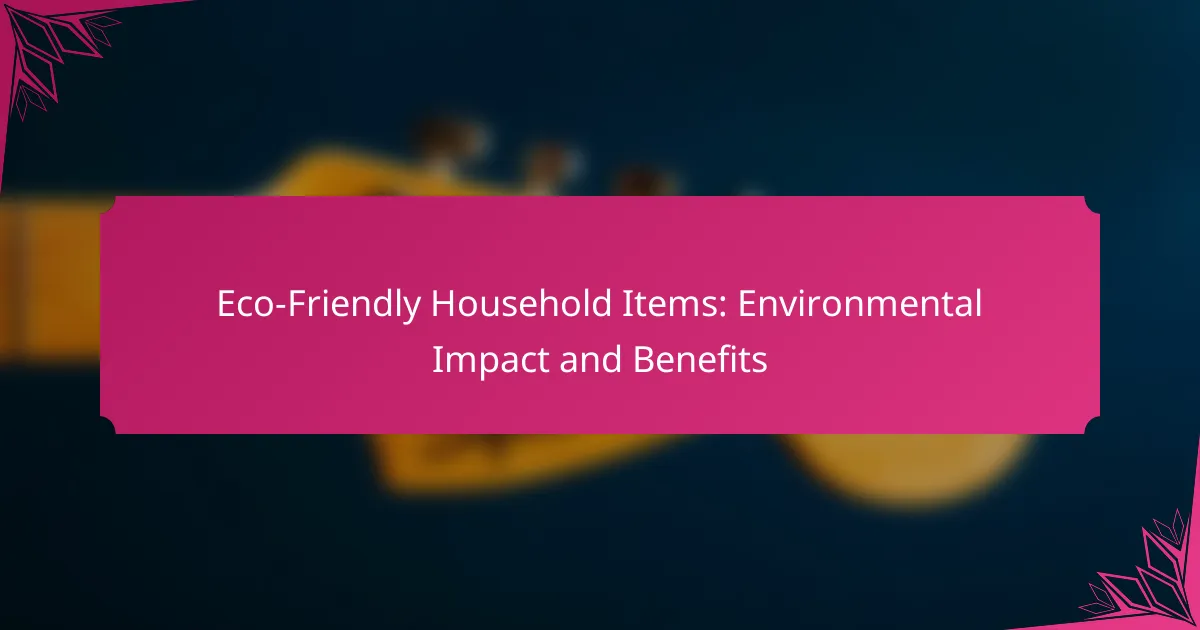Eco-friendly household items are designed to minimize environmental impact while providing essential functionality. By utilizing sustainable materials and promoting responsible consumption, these products help reduce waste, lower carbon emissions, and create healthier living conditions. Embracing eco-friendly options not only benefits the planet but also enhances the quality of life in your home.

What are eco-friendly household items?
Eco-friendly household items are products designed to minimize environmental impact while maintaining functionality. These items often use sustainable materials, reduce waste, and promote healthier living conditions.
Biodegradable cleaning products
Biodegradable cleaning products break down naturally and do not contribute to pollution. They typically contain plant-based ingredients that are less harmful to the environment compared to conventional cleaners.
When choosing biodegradable cleaners, look for certifications or labels indicating they meet environmental standards. Common examples include vinegar, baking soda, and commercially available brands that specify biodegradability.
Reusable kitchenware
Reusable kitchenware includes items like stainless steel straws, glass containers, and cloth napkins that can replace single-use products. By opting for these alternatives, households can significantly reduce plastic waste.
Consider investing in durable items that can withstand frequent use and washing. For instance, silicone food storage bags are a practical choice, as they are versatile and can last for years.
Natural personal care products
Natural personal care products are made from organic ingredients and avoid synthetic chemicals, making them safer for both users and the environment. Items like shampoo bars, organic lotions, and biodegradable toothbrushes fall into this category.
When selecting personal care products, check for certifications like USDA Organic or cruelty-free labels. This ensures you are choosing products that align with eco-friendly principles.
Energy-efficient appliances
Energy-efficient appliances consume less electricity, which not only reduces utility bills but also lowers greenhouse gas emissions. Look for appliances with the ENERGY STAR label, which indicates they meet strict efficiency guidelines.
Common energy-efficient options include LED light bulbs, Energy Star-rated refrigerators, and washing machines. Upgrading to these appliances can lead to significant energy savings over time.
Compostable trash bags
Compostable trash bags are designed to break down in composting environments, reducing landfill waste. Unlike traditional plastic bags, these bags are made from renewable materials and can decompose within a few months.
When using compostable bags, ensure they are placed in a proper composting system to achieve effective breakdown. Look for bags certified by organizations like the Biodegradable Products Institute (BPI) for assurance of their compostability.

How do eco-friendly household items impact the environment?
Eco-friendly household items significantly reduce environmental harm by minimizing waste, lowering carbon emissions, and conserving natural resources. These products are designed to be sustainable, promoting a healthier planet through responsible consumption and production practices.
Reduction of plastic waste
Using eco-friendly household items helps decrease the amount of plastic waste generated. Traditional products often come in single-use plastic packaging, which contributes to pollution and landfill overflow. By opting for items made from biodegradable materials or those that are reusable, consumers can significantly cut down on their plastic footprint.
For instance, switching from plastic wrap to beeswax wraps or using glass containers instead of plastic can lead to a substantial reduction in plastic waste. Simple changes like these can contribute to a cleaner environment and promote sustainable practices.
Lower carbon footprint
Eco-friendly household items typically have a lower carbon footprint compared to their conventional counterparts. This reduction is often achieved through sustainable manufacturing processes, which use less energy and produce fewer greenhouse gas emissions. By choosing products made from renewable resources, consumers can help mitigate climate change.
For example, purchasing locally sourced cleaning products reduces transportation emissions, while energy-efficient appliances consume less power, further lowering overall carbon emissions. These choices not only benefit the environment but can also lead to cost savings on energy bills over time.
Conservation of natural resources
Eco-friendly household items contribute to the conservation of natural resources by minimizing the extraction and depletion of raw materials. Many sustainable products are made from recycled or renewable materials, which helps preserve ecosystems and biodiversity. This approach reduces the strain on resources such as water, minerals, and forests.
For instance, using recycled paper products instead of virgin paper can save trees and reduce water usage in production. Additionally, opting for products that are designed to last longer reduces the need for frequent replacements, further conserving resources and promoting sustainability.

What are the benefits of using eco-friendly household items?
Using eco-friendly household items offers numerous benefits, including improved health, cost savings, and support for sustainable practices. These products are designed to reduce environmental impact while enhancing the quality of life in your home.
Healthier indoor air quality
Eco-friendly household items typically contain fewer harmful chemicals compared to conventional products. This leads to healthier indoor air quality, reducing the risk of respiratory issues and allergies. For example, natural cleaning agents often use plant-based ingredients that are less likely to emit volatile organic compounds (VOCs).
To improve indoor air quality, consider using items like natural air fresheners, biodegradable cleaning supplies, and non-toxic paints. These alternatives can significantly decrease the presence of irritants in your living space.
Cost savings over time
While eco-friendly products may have a higher upfront cost, they often lead to significant savings in the long run. Durable items, such as reusable bags and containers, reduce the need for frequent replacements and disposable alternatives. For instance, investing in a high-quality water filter can save money on bottled water over time.
Additionally, energy-efficient appliances can lower utility bills by consuming less power. Look for products with energy ratings to maximize savings and minimize environmental impact.
Support for sustainable brands
Choosing eco-friendly household items supports brands committed to sustainable practices. Many of these companies prioritize ethical sourcing, fair labor practices, and environmentally responsible manufacturing processes. By purchasing their products, you contribute to a market that values sustainability.
Research brands that align with your values and check for certifications like Fair Trade or organic labels. This ensures that your purchases not only benefit your household but also promote a healthier planet and community.

How to choose eco-friendly household items?
Choosing eco-friendly household items involves assessing their environmental impact and benefits to ensure they align with sustainable practices. Focus on certifications, ingredient transparency, and the product lifecycle to make informed decisions.
Look for certifications
Certifications can indicate that a product meets specific environmental standards. Look for labels such as Energy Star, USDA Organic, or Green Seal, which signify that the item has undergone rigorous testing for sustainability.
These certifications help consumers identify products that minimize environmental harm. Always check for the latest certifications, as standards can evolve and new labels may emerge.
Evaluate ingredient transparency
Ingredient transparency is crucial when selecting eco-friendly items. Products should list all ingredients clearly, allowing you to avoid harmful chemicals and choose safer alternatives.
Look for items that use natural, biodegradable ingredients instead of synthetic ones. Familiarize yourself with common harmful substances, such as phthalates and parabens, to make better choices.
Consider product lifecycle
Understanding a product’s lifecycle helps you assess its overall environmental impact. Consider how the item is made, used, and disposed of, as well as its durability and recyclability.
Opt for products designed for longevity and those that can be easily recycled or composted at the end of their life. This approach reduces waste and promotes a circular economy, benefiting the environment in the long run.

Where to buy eco-friendly household items in the US?
In the US, eco-friendly household items can be found in various places, including online marketplaces, specialty eco-stores, and local health food stores. Each option offers unique benefits and product selections that cater to environmentally conscious consumers.
Online marketplaces like Amazon
Online marketplaces such as Amazon provide a vast selection of eco-friendly household items, ranging from biodegradable cleaning products to sustainable kitchenware. Shoppers can easily compare prices, read reviews, and find items that meet their environmental standards.
When purchasing from these platforms, look for products labeled with certifications like USDA Organic or Green Seal to ensure they meet eco-friendly criteria. Keep an eye out for bulk purchasing options, which can reduce packaging waste and save money.
Specialty eco-stores like Grove Collaborative
Specialty eco-stores, such as Grove Collaborative, focus exclusively on sustainable products, offering a curated selection of household items that are environmentally friendly. These stores often provide subscription services, allowing customers to receive regular shipments of their favorite eco-products.
Shopping at these stores can be beneficial for those who want to support brands committed to sustainability. Many of these retailers also offer educational resources about the environmental impact of their products, helping consumers make informed choices.
Local health food stores
Local health food stores frequently carry eco-friendly household items, including organic cleaning supplies and reusable kitchen products. These stores often prioritize local and sustainable brands, making it easier to support the community while shopping sustainably.
When visiting a health food store, take the time to ask staff for recommendations on eco-friendly products. They can provide insights into the best choices available and may offer discounts for bulk purchases or loyalty programs.

What are the best brands for eco-friendly household items?
Some of the best brands for eco-friendly household items include Seventh Generation, Method, and Ecover. These companies focus on sustainable practices, using biodegradable ingredients and recyclable packaging to minimize environmental impact.
Seventh Generation
Seventh Generation is known for its wide range of eco-friendly cleaning products, including laundry detergents, dish soaps, and surface cleaners. Their products are made with plant-based ingredients and are free from harmful chemicals, making them safe for both your family and the environment.
When choosing Seventh Generation, look for their certifications, such as USDA Certified Biobased Product and EPA Safer Choice, which indicate their commitment to sustainability. Their products are widely available in stores and online, often at competitive prices compared to conventional brands.
Method
Method offers stylish and effective cleaning solutions that are biodegradable and made from non-toxic ingredients. Their product line includes everything from all-purpose cleaners to hand soaps, all packaged in environmentally friendly materials.
Method’s commitment to sustainability is evident in their use of recycled plastic for packaging and their carbon-neutral manufacturing processes. They are a great choice for consumers looking to reduce their ecological footprint while maintaining a clean home.
Ecover
Ecover specializes in eco-friendly laundry and dishwashing products, utilizing plant-based ingredients and renewable energy in their production. Their formulas are designed to be tough on stains while being gentle on the planet.
In addition to their cleaning products, Ecover emphasizes transparency in their ingredient sourcing and manufacturing processes. They are a solid option for those seeking effective cleaning solutions without compromising environmental values.
